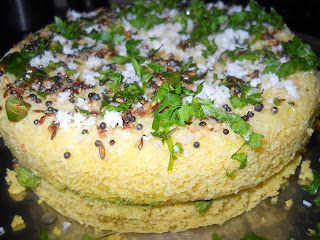 |
| dhokla sandwich |
 |
| khaman dhokla |
The stores are flooded
with ‘Khaman Dhokla’ mixes of various brands – I have tried Gits and a few others and they turn out pretty good. But when you can prepare the same at home from scratch without
much labor and end up with equally good results at a much lesser price, wouldn’t
you love to give it a try?
Have you relished ‘dhokla sandwich’? Yummy, isn’t it? No big deal – you can prepare it at home with this tried and tested ‘khaman dhokla’ recipe and green chutney!
Have you relished ‘dhokla sandwich’? Yummy, isn’t it? No big deal – you can prepare it at home with this tried and tested ‘khaman dhokla’ recipe and green chutney!
Ingredients
1.
Chickpea flour/Besan –
1 Cup
2.
Water – 3/4 cup
3.
Green Chilly – 1 or 2
4.
Ginger – 1 inch piece
5.
Oil – 1 tbsp
6.
Sugar – 1 tsp
7.
Turmeric Powder – a
pinch
8.
Eno – 1 packet (5 gm)
(1 tsp)
9.
Salt to taste
For tempering
1.
Oil – 1 ½ tbsp
2.
Mustard Seeds – 1 tsp
3.
Cumin seeds – ½ tsp
4.
Sesame seeds – ½ tsp
5.
Green chilly – 1
(chopped)
6.
Asafoetida – a pinch
7.
Curry leaves - 6
8.
Water – 2 -2 ½ tbsp
9.
Lime juice – 1 tsp
10.
Fresh coriander leaves
(finely chopped)
11.
Grated coconut – 1 ½
tbsp
Method
1.
Grind green chilly and
ginger.
2.
In a bowl, add the besan
(chickpea flour), turmeric powder, salt, sugar, green chilly- ginger paste,
oil, mix well.
3.
Now add water to the
flour mix and mix well to form a thick batter (like idli batter).
4.
Set aside for 40-60
minutes.
5.
Heat the cooker with
water for steaming. Grease a flat cooker vessel.
6.
Sprinkle the eno fruit
salt to the batter and mix well, stirring in one direction and pour immediately
into the greased cooker vessel.
7.
Steam for 10 to 15
minutes.
8.
Remove and allow to
cool.
9.
Heat a small frying
pan with 1½ tbsp oil. Add mustard, cumin and sesame seeds; once they crackle,
turn off the heat and add asafoetida powder and the chopped green chilly and
curry leaves. Add 2 - 2 1/2 tbsp. of water. Then add the lime juice and mix well.
10.
Pour this over the
steamed dhokla so that it is spread all over it.
11.
Garnish with chopped
coriander leaves and grated coconut.
12.
Cut into desired
shapes and serve with green chutney / ketchup.
Tips
Another friend’s recipe uses a mixture of curd (1/2 cup –
whisked) and water (1/4 cup) instead of water alone; the rest of the ingredients for the recipe is
the same. This mix does not have to be set aside but can be used immediately. So
skip step 4 and start from step 5. The rest of the procedure is the same. So in
case you are in a hurry and have curd at hand, you can try out this recipe.
If you find it cumbersome to grind green chilly and ginger, use
ginger paste or finely chopped ginger; chopped green chillies are anyway used in the 'tadka'.
Dhokla Sandwich
Use 1 1/2 cups of gram flour and corresponding ingredients and pour in two oiled containers and make 2 dhoklas. Cool and remove both the dhoklas out carefully.
Spread green chutney on one of them and place the other on it.
Repeat steps 9-12 above.
Cut in desired shapes and serve with ketchup.
Dhokla Sandwich
Use 1 1/2 cups of gram flour and corresponding ingredients and pour in two oiled containers and make 2 dhoklas. Cool and remove both the dhoklas out carefully.
Spread green chutney on one of them and place the other on it.
Repeat steps 9-12 above.
Cut in desired shapes and serve with ketchup.
Alternately, spread green chutney on one dhokla and ketchup on the other and make dhokla sandwich and repeat steps 9-12.
© Copyright 2011. Brinda Balasubramonian.









Fantastic recipe.. Thanks periamma for sharing the same... :)
ReplyDeleteThanks Vijeta!
ReplyDelete